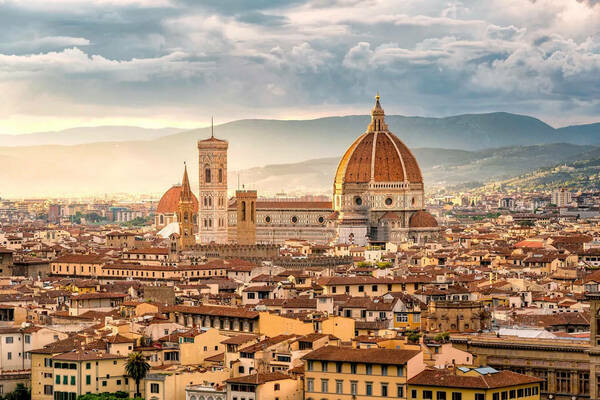The tradition of political realism has a reputation for being pessimistic—that is, for seeing and expecting the worst from the world, its individuals, and its states. Yet, despite all his realism, Niccolò Machiavelli was a romantic about his city. He famously said in a letter to his friend, diplomat Francesco Vettori, “I love my city more than my own soul” (amo la patria piu dell’ anima).

In 1512, the Medici retook Florence from Piero Soderini, and removed Machiavelli from his diplomatic position. The following year, they accused him of conspiring against them and tortured him for three weeks. After this, Machiavelli retired to his family home in Sant’Andrea, and never ceased to lament his “great and continued malignity of fortune” (una grande e continova malignità di fortuna) of not being able to contribute to his city’s administration.
Exiled from praxis, Machiavelli theorised about politics. He wrote two historical works—Discourses on Livy and Florentine Histories—to speak to the ways in which he thought that the Italy of his day should aspire to the glory of ancient Rome and the ways in which it failed to do so. He never rejected his being a modern man, and he did not believe that Renaissance Italy could imitate ancient Rome in all respects. However, he pushed his fellow citizens to take inspiration from it and to consider carefully that they share something with their past: it’s not “as if heaven, sun, elements, [and] men had varied in motion, order, and power from what they were in antiquity” (1998, 6).
One cannot, then, study Machiavelli’s Florence without studying his idea of Rome: its founding, in what ways the existence of the Roman empire shaped how we understand politics, and the institutions that seek to temper the constant flux that characterizes it. Machiavelli clearly deemed Florence to have failed to live up to its potential despite having (as Rome did) productively conflictual “humours” present within it. He believed that the Romans channeled the tumult of the ambitions and the desires of those who wish to command and those who do not wish to be commanded towards a mixed constitution that allowed Rome to flourish. Contrastingly, he disdained the Florentine elite for being self-absorbed and petty in his description of the foundation of Florence and its Guelph and Ghibelline factions, and he chastised the licentiousness of the impatient and fickle Florentine public during the Ciompi Revolt. Machiavelli depicted a fall from an idealised Roman grace. He did so even though he knew that people (especially Giulio de’ Medici, who commissioned a history of Florence from him) would much prefer aggrandizement and forceful rhetoric; he remained a realist despite it all.

Good realists acknowledge and affirm their reality and attempt to better it even when the odds are not in their favor, even when they themselves are not optimistic. There is a peculiar type of optimism and heroism to their project. The best articulation of this sentiment is, perhaps, Max Weber’s: “The only man who has a ‘vocation’ for politics is one who is certain that his spirit will not be broken if the world, when looked at from his point of view, proves too stupid or base to accept what he wishes to offer it, and who, faced with all that obduracy, can still say ‘Nevertheless!’ despite everything” (2004, 93-94). Machiavelli was such a man, whose city continued to inspire him through the ups and downs of his life—it was the thing that he loved, lived, and died for.
Suggested further reading
Machiavelli, Niccolò, trans. Harvey C Mansfield and Nathan Tarcov. Discourses on Livy. Chicago: University of Chicago Press, 1998.
Weber, Max, ed. David S Owen and Tracy B Strong, trans. Livingstone, Rodney. The Vocation Lectures. Indianapolis: Hackett Pub., 2004.
About the author

Shasta Kaul is a third-year political science Ph.D. student at the University of Notre Dame. She holds an M.A. in social sciences from the University of Chicago and a B.A. in Philosophy, Politics, and Economics (PPE) from the University of Oxford.
Through the works of Machiavelli and Kautilya, in her dissertation, Shasta plans to explore how political realism can challenge and reframe existing approaches to value pluralism in modern democratic societies. She is also interested in how states, as the loci of power, have understood their own practical and normative functions over time.